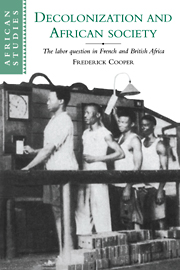Book contents
- Frontmatter
- Contents
- List of tables and figure
- Preface
- List of abbreviations
- Map of French and British colonial Africa
- 1 Introduction
- Part I The dangers of expansion and the dilemmas of reform
- Introduction
- 2 The labor question unposed
- 3 Reforming imperialism, 1935–1940
- 4 Forced labor, strike movements, and the idea of development, 1940–1945
- Conclusion: posing the labor question
- Part II Imperial fantasies and colonial crises
- Part III The imagining of a working class
- Part IV Devolving power and abdicating responsibility
- Conclusion
- Notes
- Bibliography
- Index
- OTHER BOOKS IN THE SERIES
Conclusion: posing the labor question
Published online by Cambridge University Press: 22 February 2010
- Frontmatter
- Contents
- List of tables and figure
- Preface
- List of abbreviations
- Map of French and British colonial Africa
- 1 Introduction
- Part I The dangers of expansion and the dilemmas of reform
- Introduction
- 2 The labor question unposed
- 3 Reforming imperialism, 1935–1940
- 4 Forced labor, strike movements, and the idea of development, 1940–1945
- Conclusion: posing the labor question
- Part II Imperial fantasies and colonial crises
- Part III The imagining of a working class
- Part IV Devolving power and abdicating responsibility
- Conclusion
- Notes
- Bibliography
- Index
- OTHER BOOKS IN THE SERIES
Summary
After November 1942, French and British Africa were officially on the same side of the great struggle of the day, and both sought to mobilize their African populations for the “battle of production.” Up to that point, those populations had experienced the war quite differently. British Africans had fought in a long war, and larger numbers were mobilized – by force, by the attraction of wages, or by pressures that lay somewhere in between – to produce for it. Vichy Africa had been cut off, much of its production bought up by the state so as not to cause the entire market economy to shut down. British officials wanted to expand exports and minimize imports, and they faced more directly than the French the social consequences of directed economic mobilization.
Vichy and London ardently planned for what both came to call development, and they did so in ways that were strangely detached from what their officials on the scene were facing. Vichy's planning took place in a dream world, set off by the gap between its rhetoric of a coordinated and prosperous French empire and the tawdriness of what it actually did. Vichy's fascisant language aside, its thinking on development was perhaps only a step further removed than London's from the messiness of colonial Africa in the 1940s, but in both capitals the wartime efforts to think about development would have long-lasting consequences.
- Type
- Chapter
- Information
- Decolonization and African SocietyThe Labor Question in French and British Africa, pp. 167 - 170Publisher: Cambridge University PressPrint publication year: 1996



